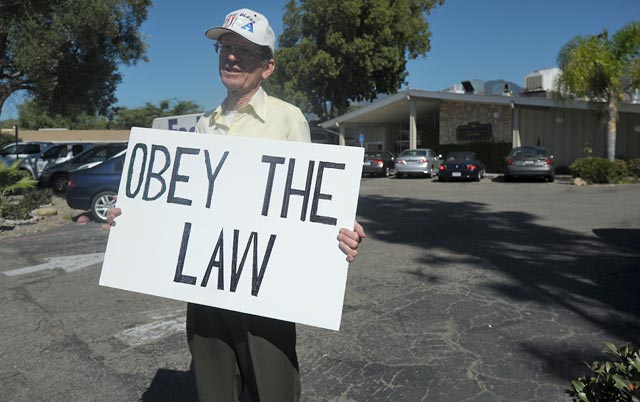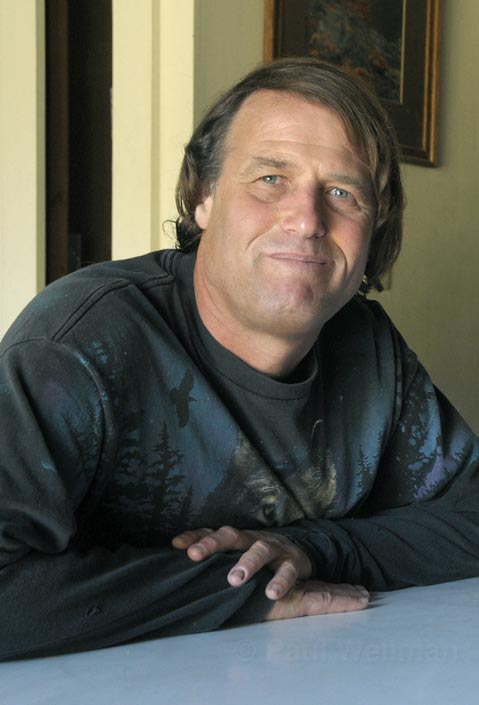Nursing Home Whistleblower’s Unsung Story
Jailed for Trespassing After Reporting Abuse to State

The following is the story of a local citizen who helped the Santa Barbara nursing home Central Coast Nursing Center lose its license to operate.
He is Edmund Finucane, a 70-year-old man, a good Samaritan who has been visiting this facility at 3880 Via Lucero (near La Cumbre and State) for 28 years. There are such people out there, who volunteer their time to bring comfort to nursing home residents, often put away by their relatives and not visited enough by them.

Edmund Finucane had visited residents for all those years (probably over a thousand times) without having any problems with the management. After the facility’s activities director asked him to, Edmund volunteered to lead some religious services at the facility–during which he played violin! He did this for several years. In addition to this, he assisted with his denomination’s services at the facility. He is well known by many residents now living there.
But just within the last year, his life took a big turn after he found terrible abuse and started reporting it to the state. For the first time, he was told he couldn’t visit the nursing home, that it constituted trespassing. Feeling that the residents had the right to have visitors, on January 26, 2011, Edmund disobeyed those orders, and found himself arrested. He spent time in jail at taxpayer expense. He had never been arrested before.
The District Attorney’s office treated him like a criminal. Instead of persecuting the man who reported the abuse, the D.A.’s office should have joined the California Department of Public Health in going after this facility. How many of our tax dollars did the D.A.’s office use in its effort to portray Edmund as a criminal? And why didn’t they have the wherewithal to treat him better? Didn’t they know the sad history of this location, under different owners – the long history of elder abuse occurring there? If not, why not? Instead of cooperating with the nursing home’s efforts to intimidate him, they should have given him an award.
The prosecuting attorney for the DA’s office said they’d drop the charge if Edmund agreed to accept her condition, that he “behave himself” while visiting the nursing home. The nursing home had its own, additional requirements for visitation. They wanted him to fill out an employment application and get tested for tuberculosis. They also wanted him to get written permission from the next of kin. Never mind that the residents have full constitutional and human rights, including the right to meet with visitors of their choice.
Because Edmund felt that he had done nothing wrong, and that agreeing to the D.A.’s demand was akin to admitting guilt, he insisted on going to trial. He couldn’t afford an attorney, so he represented himself. The charge was soon dropped, without any conditions, on July 29, 2011. The D.A.’s office and nursing home had played a cat-and-mouse game with Edmund for six months, and Edmund realized he could put a stop to it by insisting on his right to a jury trial.
On August 25, 2011, this nursing home was no longer allowed to operate “because of serious violations related to quality of care and actual harm to patients” according to Cheryl Gordon of the California Department of Public Health. Fortunately, the 150 or so residents weren’t turned out into the streets, as Compass Health took over immediately. Was Edmund vindicated by this happening? No. Expecting a different and kinder management, on September 15 he returned to the building only to be told he’d be once again arrested if he visited. The police were again called.
Never mind that an elderly woman, a friend, was anticipating his arrival, and had to witness the confrontation. Edmund was told he’d have to agree to all kinds of conditions to visit residents. He’d have to give his ID and submit to a background check. He couldn’t meet in private with residents. He’d be fingerprinted, etc.
I’ve visited nursing homes before and fortunately never was subjected to any of this. There seems to be a growing trend to discourage visitation, to treat visitors like criminals. These kinds of conditions aren’t a legal requirement, and being confronted with them is enough to make many people not want to visit. Nursing homes can neglect their residents a lot easier if it’s made difficult for outsiders to observe.
Hopefully, this nursing home operator won’t be as abusive as the last one. Darrin Smith, the Chief Operating Officer, says he cares and wants to change things. But can we really be sure this will happen? Change may be difficult in these kinds of facilities; it’s too easy to neglect and mistreat the elderly if no one’s watching. After all, nursing homes can be very challenging workplaces and good employees are often not paid what they are worth. To prevent bad things from happening, and to keep moods bright, a lot more people like Edmund are needed – who will insist on their right to visit.



